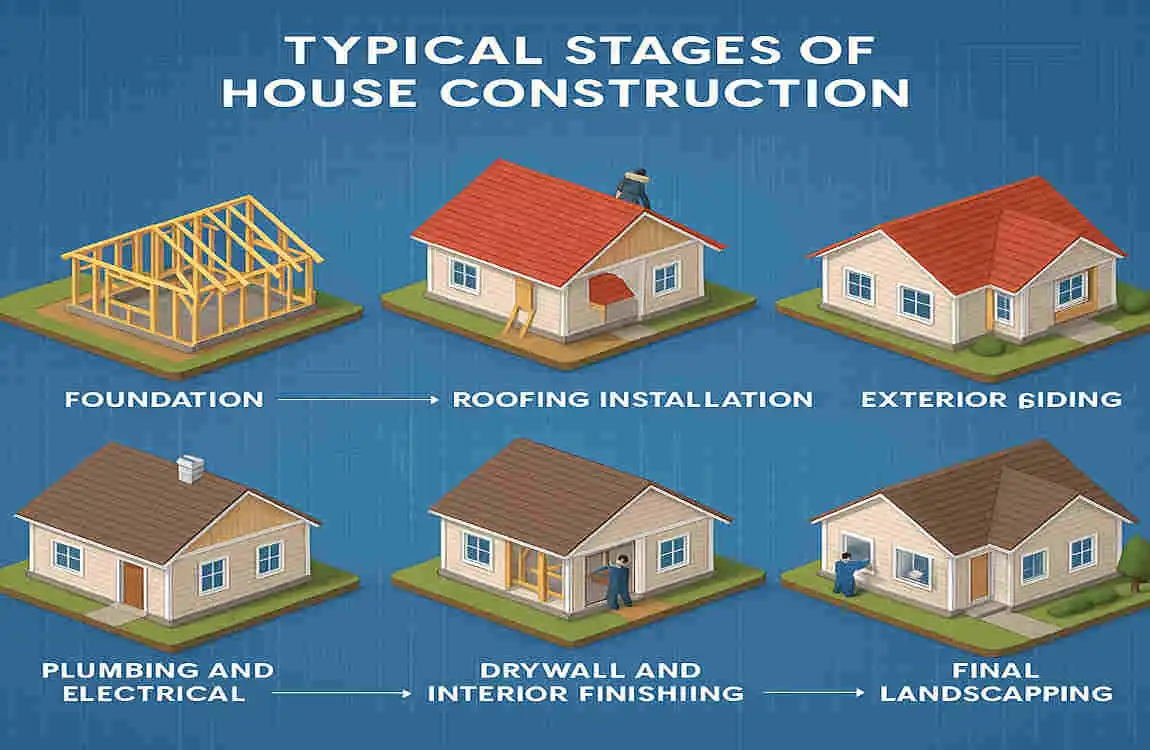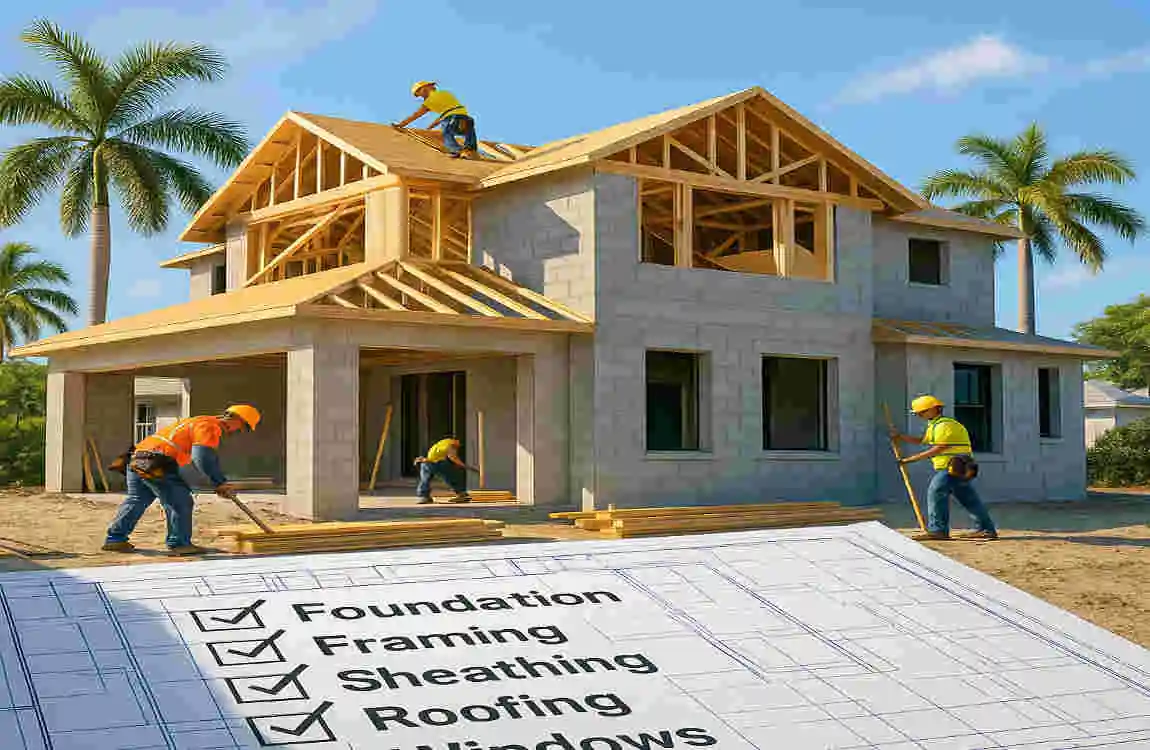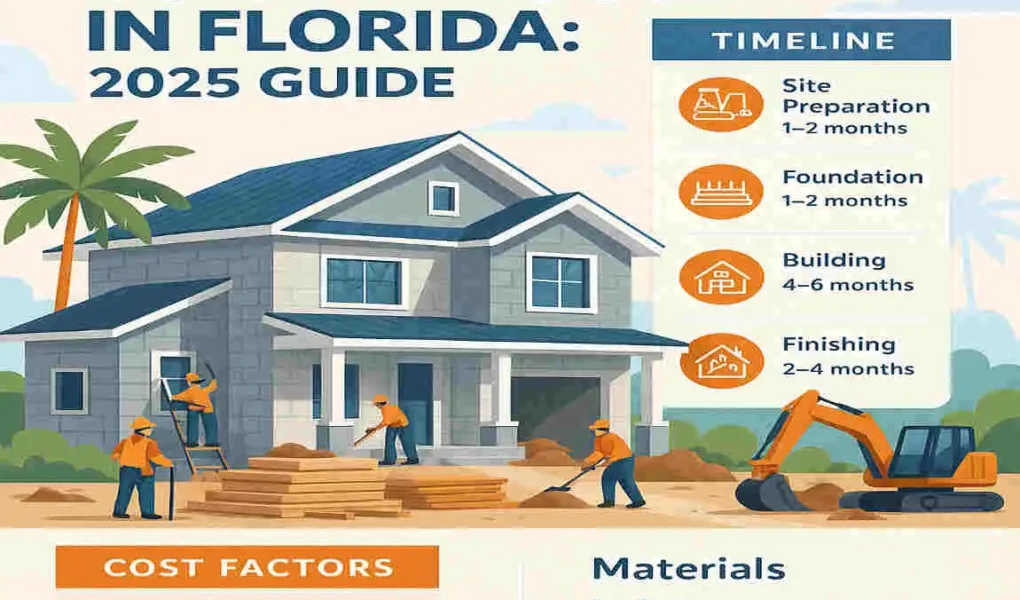Dreaming of building your own home in the Sunshine State? You’re not alone! Florida’s stunning landscapes and vibrant communities make it a top choice for many homebuyers. However, before you delve into the exciting world of home construction, it’s essential to understand the timeline, costs, and unique factors associated with building a house in Florida.
Understanding the Building Process in Florida

The Typical Stages of Building a House
Building a house is a complex process that involves several key stages. From land acquisition and site preparation to final inspections and move-in, each step plays a crucial role in bringing your vision to life. Here’s a brief overview of the typical stages you can expect when building a house in Florida:
- Land Acquisition and Preparation: Finding the perfect lot for your home and preparing the site for construction.
- Design and Planning: Working with an architect or designer to create the perfect floor plan and design for your home.
- Permitting and Approvals: Obtaining the necessary permits and approvals from local authorities before breaking ground.
- Foundation Work: Laying the foundation that will support your home, whether it’s a slab, stilts, or piers.
- Framing and Structural Work: Constructing the frame and structural elements of your home, such as walls, floors, and the roof.
- Utilities and Systems: Installing plumbing, electrical, and HVAC systems throughout your home.
- Interior and Exterior Finishing: Adding the final touches, such as drywall, flooring, fixtures, and landscaping.
- Final Inspections and Approvals: Ensuring your home meets all building codes and regulations before you can move in.
What Makes Florida Unique?
While the basic stages of building a house remain the same, Florida presents some unique factors that can influence the construction process. From hurricane codes to flood zones, here are a few key considerations:
- Hurricane Codes: Florida’s strict building codes are designed to protect homes from the destructive forces of hurricanes. These codes may require additional reinforcement and impact-resistant materials, which can impact the timeline and cost of construction.
- Flood Zones: Many areas in Florida are prone to flooding, which means you may need to elevate your home on stilts or piers to meet flood zone regulations. This can add time and expense to the building process.
- Permitting Process: Florida has a comprehensive permitting process in place to ensure that all construction projects meet local regulations. Navigating this process can take time and may require the assistance of a knowledgeable local builder.
The Importance of Local Expertise
Given Florida’s unique building requirements, it’s essential to work with local experts who understand the state’s regulations and best practices. A knowledgeable local builder can help you navigate the permitting process, choose the right materials for your home, and ensure that your construction stays on track.
How Long Does It Take to Build a House in Florida? Updated 2025 Timeline
Now that we’ve covered the basics of the building process, let’s dive into the updated 2025 timeline for building a house in Florida. Please note that these are average durations and may vary depending on factors such as location, project size, and complexity.
Detailed Timeline Breakdown by Phases
Here’s a detailed breakdown of the timeline for each phase of construction:
Land Acquisition and Preparation
- Duration: 1-3 months
- Description: This phase involves finding the perfect lot for your home and preparing the site for construction. It may include clearing the land, grading, and adding fill as needed.
Permitting Process
- Duration: 1-3 months
- Description: Obtaining the necessary permits and approvals from local authorities is a crucial step in the building process. The duration can vary depending on the complexity of your project and the efficiency of the local permitting office.
Foundation Work
- Duration: 1-2 weeks
- Description: Laying the foundation is a critical step that sets the stage for the rest of your home’s construction. In Florida, you may need to choose between a slab foundation, stilts, or piers, depending on your location and flood zone requirements.
Framing and Structural Work
- Duration: 2-4 weeks
- Description: This phase involves constructing the frame and structural elements of your home, including walls, floors, and the roof. In Florida, you may have the option to choose between wood framing, concrete blocks, or insulated concrete forms (ICF) for added hurricane resistance.
Roofing, Plumbing, and Electrical Installations
- Duration: 2-4 weeks
- Description: Once the framing is complete, it’s time to install the roofing, plumbing, and electrical systems throughout your home. These systems are crucial for ensuring the functionality and safety of your home.
Interior Finishing
- Duration: 4-8 weeks
- Description: The interior finishing phase is where your home really starts to take shape. This includes installing drywall, flooring, fixtures, and other finishing touches that will make your house feel like a home.
Final Inspections and Approvals
- Duration: 1-2 weeks
- Description: Before you can move into your new home, it must pass final inspections and receive all necessary approvals from local authorities. This ensures that your home complies with all applicable building codes and regulations.
Average Duration and Total Estimated Time Range
Based on the average durations for each phase, you can expect the entire construction process to take anywhere from 6 to 12 months from start to finish. However, please note that this is just an estimate, and your project may take more or less time, depending on various factors.
Timeline Variations by County or City
While the overall timeline remains relatively consistent across Florida, variations may occur depending on the specific county or city where the building is located. Factors such as local permitting processes, weather patterns, and the availability of labour and materials can all impact the duration of your project.
For example, coastal areas may have stricter building codes and longer permitting processes due to their vulnerability to hurricanes. Similarly, areas with high demand for construction may experience longer wait times for permits and inspections.
To get a more accurate estimate for your specific location, it’s best to consult with local builders and contractors who have experience working in your area.
Cost Factors That Influence Build Time
Now that we’ve covered the timeline, let’s discuss the costs associated with building a house in Florida. While the total cost will depend on various factors, such as size, materials, and location, certain key cost factors can significantly impact the build time of your project.
Budget and Financing
Your budget and financing options can significantly impact the timeline of your construction project. If you have a limited budget, you may need to make compromises on materials or finishes, which can affect the overall duration of the build.
Similarly, the type of financing you choose can influence the timeline. For example, construction loans often have specific draw schedules that dictate when funds are released to the builder. If there are delays in the draw process, it can slow down the construction timeline.
Construction Loans and Payment Schedules
Speaking of construction loans, the payment schedule can also impact the build time. Most construction loans are disbursed in a series of draws, with each draw tied to the completion of specific milestones in the construction process.
If there are delays in meeting these milestones, it can hold up the release of funds and slow down the overall project. To avoid these delays, it’s important to work closely with your lender and builder to ensure that everyone is on the same page and that the draw schedule aligns with the construction timeline.
Material Availability and Labour Market Conditions
The availability of materials and labour can also impact the build time of your Florida home. If there are shortages of certain materials or skilled labour in your area, it can lead to delays in the construction process.
For example, if there’s a shortage of lumber or concrete, it may take longer to source these materials and keep the project on track. Similarly, if there’s high demand for skilled tradespeople, such as electricians or plumbers, it may be challenging to schedule their work promptly.
To mitigate these risks, it’s essential to collaborate with a builder who has established strong relationships with suppliers and subcontractors. They can help you navigate any supply chain or labour issues that may arise during the construction process.
Weather Conditions
Finally, weather conditions can significantly impact the build time of your Florida home. With the state’s warm and humid climate, there’s always a risk of rain, storms, or even hurricanes that can disrupt construction.
While builders do their best to work around the weather, there may be times when it’s simply not safe or feasible to continue working on your home. These weather-related delays can add time to the overall construction timeline.
To minimise the impact of weather on your project, it’s essential to have a flexible schedule and a builder with experience working in Florida’s climate. They can help you plan for potential delays and keep your project on track as much as possible.
Expert Tips to Expedite Building Your Florida Home

Now that we’ve covered the timeline and cost factors, let’s explore some expert tips to help you expedite the building process and move into your dream home as quickly as possible.
Hire a Knowledgeable Local Builder
One of the most important steps you can take to expedite the construction process is to hire a knowledgeable local builder who is familiar with Florida’s unique building requirements. A local builder will have experience navigating the permitting process, working with local suppliers and subcontractors, and building homes that can withstand the state’s weather conditions.
When selecting a builder, be sure to ask about their experience building in Florida, their familiarity with local regulations, and their track record of completing projects on time and within budget. A good builder will be able to provide references and examples of their work to help you make an informed decision.
Manage Permits Efficiently
The permitting process can be one of the most time-consuming aspects of building a house in Florida. To expedite this process, it’s essential to collaborate closely with your builder and local authorities to ensure that all necessary permits are obtained promptly.
Your builder should have a clear understanding of the permitting requirements for your project and be able to submit all necessary documentation promptly. They should also be proactive in following up with the permitting office to ensure that your application is being processed efficiently.
In some cases, it may be possible to apply for certain permits concurrently rather than sequentially, which can help speed up the overall process. Your builder should be able to advise you on the best strategy for managing permits based on their experience and knowledge of local regulations.
Follow Construction Best Practices
Another way to expedite the building process is to follow construction best practices that can help minimise delays and keep your project on track. Some key best practices to keep in mind include:
- Maintain a clean and organised job site: A well-organised job site can help improve efficiency and reduce the risk of accidents or delays.
- Schedule work efficiently: Work with your builder to create a detailed schedule that takes into account the availability of labour and materials, as well as any potential weather-related delays.
- Communicate regularly: Good communication between you, your builder, and any subcontractors is essential for keeping the project on track. Make sure everyone is on the same page and that any issues or concerns are addressed promptly.
- Be flexible: Construction projects rarely proceed exactly as planned, so it’s essential to be adaptable and willing to make adjustments as needed to keep the project moving forward.
By following these best practices, you can help ensure that your Florida home is built as efficiently as possible, without sacrificing quality or safety.
Choose Resilient Foundation and Materials
In Florida, it’s important to choose a resilient foundation and materials that can withstand the state’s unique weather conditions. This can help minimise the risk of damage or delays caused by hurricanes, flooding, or other weather-related events.
When selecting a foundation, consider options such as stilts or piers if you live in a flood-prone area, as these can help elevate your home and protect it from water damage. For the rest of your home, consider using impact-resistant materials, such as concrete blocks or insulated concrete forms (ICFs), for added protection against hurricanes and high winds.
Your builder should be able to advise you on the best foundation and material options for your specific location and needs. By choosing resilient options, you can help ensure that your home is built to last, allowing you to move in quickly and comfortably.
Prepare for HOA Guidelines and Neighbourhood Restrictions
If you’re building in a neighbourhood with a homeowners association (HOA) or other restrictions, it’s important to prepare for these guidelines and factor them into your timeline. HOA approvals can add time to the permitting process; therefore, it’s essential to submit your plans for review as early as possible.
Work with your builder to ensure that your plans comply with all relevant HOA guidelines and neighbourhood restrictions. This may involve making adjustments to your design or materials to meet these requirements. By addressing these issues early on, you can help avoid delays later in the construction process.
Keep Construction on Budget and Timeline
Ultimately, one of the most effective ways to expedite the building process is to keep your construction project on budget and on schedule. This requires careful planning, regular communication with your builder, and a willingness to make adjustments as needed.
To stay on budget, work with your builder to create a detailed budget that takes into account all anticipated costs, including materials, labour, and any unexpected expenses. Monitor your spending regularly and be prepared to make adjustments if necessary to keep your project within budget.
To stay on timeline, work with your builder to create a detailed schedule that outlines all key milestones and deadlines. Communicate regularly to ensure that everyone is on the same page and that any issues or delays are addressed promptly. Be flexible and willing to make adjustments as needed to keep the project moving forward.
Keeping your construction project on budget and timeline helps ensure that your Florida home is built as efficiently as possible, allowing you to move in and start enjoying your new home as soon as possible.
Common Challenges and How to Overcome Them
While building a house in Florida can be an exciting and rewarding experience, it’s not without its challenges. Here are some common challenges you may encounter during the construction process, along with tips for overcoming them.
Permit Approval Delays
One of the most common challenges when building in Florida is the delay in obtaining permit approval. The state has strict building codes and regulations, which can result in a lengthy permitting process.
To overcome this challenge, work closely with your builder to ensure that all necessary documentation is submitted promptly and accurately. Follow up regularly with the permitting office to check on the status of your application and address any issues or concerns as soon as possible.
In some cases, it may be possible to expedite the permitting process by hiring a permit expeditor or working with a builder who has experience navigating the local permitting system. Your builder should be able to advise you on the best strategy for managing permits based on their knowledge of local regulations.
Weather-Related Delays
Another common challenge when building in Florida is weather-related delays. The state’s warm and humid climate can result in frequent rain, storms, and even hurricanes, which can disrupt construction.
To minimise the impact of weather on your project, collaborate with your builder to create a flexible schedule that accounts for potential weather-related delays. Be prepared to adjust your timeline as needed to accommodate any disruptions caused by the weather.
Your builder should also have experience working in Florida’s climate and be able to take steps to protect your home from weather damage during construction. This may include covering exposed materials, securing the job site, and taking other precautions to minimise the risk of harm or delays.
Unexpected Costs or Scope Changes
Another challenge you may face during the construction process is unexpected costs or scope changes. These can arise due to a variety of factors, such as changes in material prices, unforeseen site conditions, or modifications to your original plans.
To manage unexpected costs or scope changes, it’s important to have a contingency fund built into your budget. This will give you the flexibility to address any unforeseen expenses without derailing your entire project.
It’s also important to communicate regularly with your builder and be willing to make adjustments to your plans as needed. If you need to make changes to your scope or budget, work closely with your builder to find solutions that meet your needs while keeping your project on track.
Communication Issues
Finally, communication issues between you and your builder can also pose a challenge during the construction process. Misunderstandings or a lack of communication can lead to delays, cost overruns, or other issues that can impact your project.
To overcome this challenge, establish clear lines of communication with your builder from the outset. Set up regular meetings or check-ins to discuss the project’s progress and address any concerns or questions you may have.
Be sure to document all decisions and changes in writing, and keep a record of all communications with your builder. This will help ensure that everyone is on the same page and that there are no misunderstandings or surprises down the line.
By addressing these common challenges head-on and working closely with your builder, you can help ensure that your Florida home is built as smoothly and efficiently as possible.
Additional Considerations for Building in Florida 2025
As you plan your Florida home construction project, several additional considerations are worth keeping in mind, particularly in light of the latest developments and trends for 2025.
New Building Codes and Regulations
Florida is known for its strict building codes and regulations, which are designed to protect homes from the state’s unique weather conditions. In 2025, new or updated codes and regulations may be introduced, which you will need to consider when developing your construction plans.
Work with your builder to ensure that your home meets all relevant building codes and regulations for 2025. This may involve using specific materials or construction techniques to meet the latest standards for hurricane resistance, energy efficiency, or other requirements.
Energy Efficiency and Storm Resistance Innovations
In recent years, significant innovations in energy efficiency and storm resistance have emerged, enabling you to build a more resilient and sustainable home in Florida. In 2025, you may have access to new technologies and materials that can improve the performance and durability of your home.
Some examples of these innovations include:
- Solar panels and other renewable energy systems: These can help you reduce your reliance on traditional energy sources and save money on your utility bills.
- Impact-resistant windows and doors: These can help protect your home from high winds and flying debris during a hurricane.
- Insulated concrete forms (ICF): These can provide added protection against hurricanes and other severe weather events, while also improving energy efficiency.
- Green roofs and other sustainable landscaping features: These can help reduce your home’s environmental impact and improve its overall sustainability.
Work with your builder to explore these and other innovations that can help you build a more energy-efficient and storm-resistant home in Florida.
Sustainable Building Materials and Eco-Friendly Practices
In addition to energy efficiency and storm resistance, there’s a growing trend towards using sustainable building materials and eco-friendly practices in home construction. In 2025, you may have access to a wider range of sustainable options that can help you build a more environmentally friendly home.




